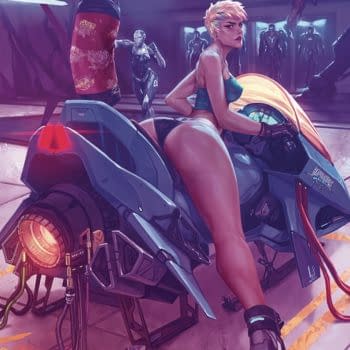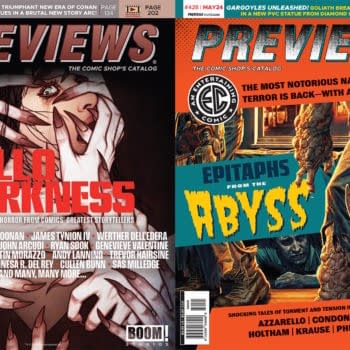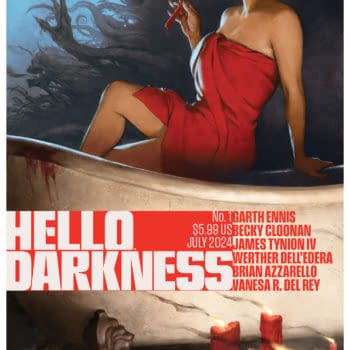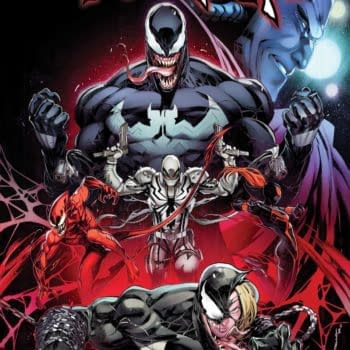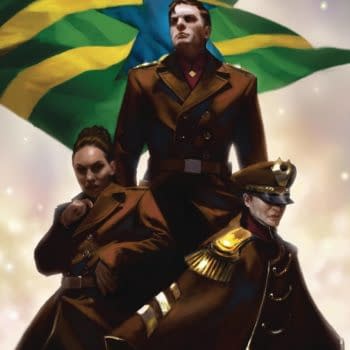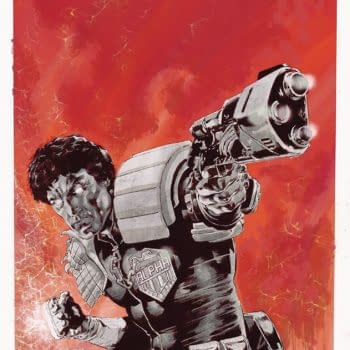Posted in: Comic Show, Comics, san diego comic con | Tagged: gender identity, LGBTQ, media representation, panel discussion, prism comics, san diego comic con, sdcc, sdcc 2015, trans, transgender
SDCC '15: Writing Transgender Character
By Joe Glass

Moderated by Prism Comics Board Member Tara Madison Avery (Gooch), the panel featured Knave Murdok (Transcat), Ronnie Ritchie (Gqutie), Kat Blaque (illustrator, animator and vlogger), Dylan Edwards (Transposes), Chris Burgoch (co-writer of film, Tangerine) and Gillian Cameron (Calogerant). Eisner-nominee Dax Tran-Caffee was supposed to also be present, but was unfortunately stuck in traffic, and only made a very brief appearance at the end.
Ritchie briefly discussed how Gqutie had started as a graduate thesis project, and is now an ongoing webcomic about being of non-binary gender.
Edwards discussed work on the female-to-male trans community, which included a series of interviews with male identifying individuals who only date men, and some non-gender binary, and adapted to a visual comic format. He discussed how many were bisexual or polyamorous, but that no matter who they were dating, they still considered their relationship queer.
This was obviously a good time to note that there are really more than two genders to consider, and endless sexualities, and just because someone may be trans does not mean they must be a particular sexuality. The trans experience is neither caused or predicated on sexuality.
Edwards also discussed a new project exploring gender identities through sci-fi, through the means of an agender society, though was keen to point out it was not an íssues' book.
The group discussed topics concerning common tropes involved in when trans characters are introduced in media, and pointed out that body dysphoria is not necessarily linked to being transgender, and equally is not a trans-only issue, and that the trans experience does not come with easy labels and that trans relationships can be very different from cisgender ones.
Ritchie discussed their social political comics for Everyday Feminism, pointing out the difficulties of being agender is that you're expected to look completely androgynous, and life can be a series of 'Pronoun Water Toture' as societally, we are predisposed to make automatic assumptions on the pronouns we use based on visual gender identification – a single event of misgendering is not really that big of a deal, Ritchie mused, the fact is it happens over and over and over, wearing away at a person.
Kat discussed how art art can be important for trans expression, especially for trans children, given the vast lack of trans representation in the media, and especially for kids. As artists, they can create and cultivate their own representation.
Kat uses popular media images to support trans youth, like children playing dress up in opposite physical gender characters such as Captain America and Wonder Woman, with the phrase 'let them be who they want to be'.
The panel went on a slight tangent, seemingly, to discuss various role-playing games, and how they can be of incredible use for young trans people to express their feelings on their gender identity, by playing the opposite gender or non-gender specific characters.
Cameron went into great depth on her work Calogerant, which will hopefully be on Kickstarter soon, about an Arthurian knight who is turned into a woman. She discussed how the character is loosely based off actual Arthurian legend, and that while yes, there is an agenda and it is a trans agenda, that is many levels down in the story. The first, important level is to write a fun story.
The question was asked of the panel how to balance writing challenging characters, which are more entertaining, with writing characters that uplift the community, to which Ritchie immediately responded it would help to have more than one trans character in a story. With the common trope of a single, isolated trans character, that single character is forced to çarry the weight' of the whole community, which is an impossible task.
There are so many paths, so many experiences, having one representation becomes counter-intuitive.
The panel ended with discussing another classic trope of trans representation in mainstream media, which is that of gender transition through fantastical means, like magic, and should it be done away with. As many of the panel have work that still features this trope, they were overwhelmingly against doing away with it, instead suggesting pride in this as an option due to the kind of story telling it can allow. It allows them to be more playful.
Cameron pointed out that we (the trans community) are magical creatures. We scare the crap out of people because we challenge their preconceived perceptions. It's okay to revel in that.











